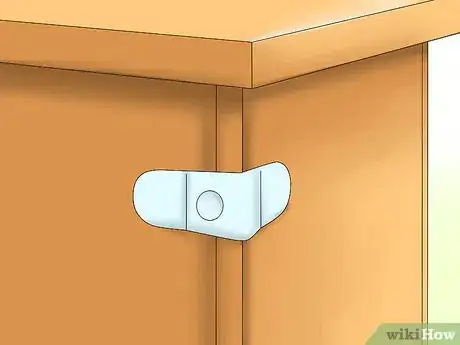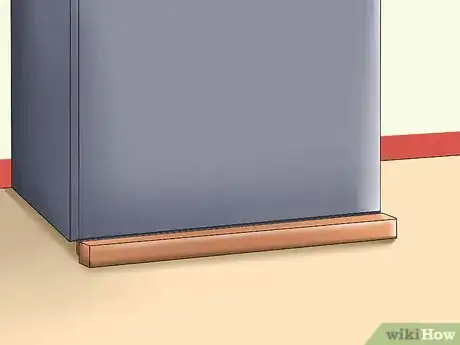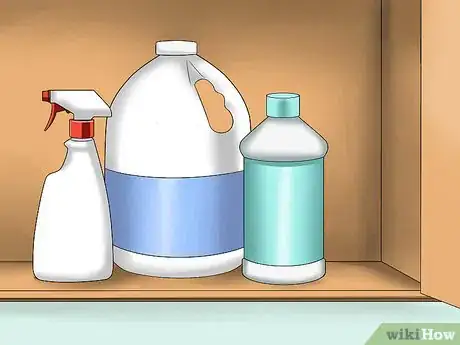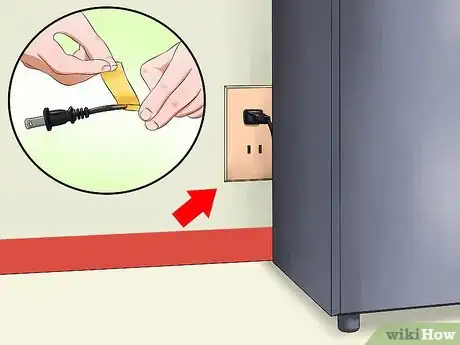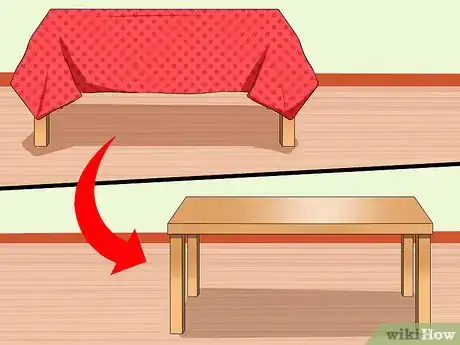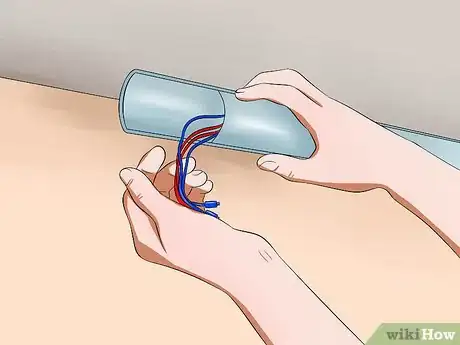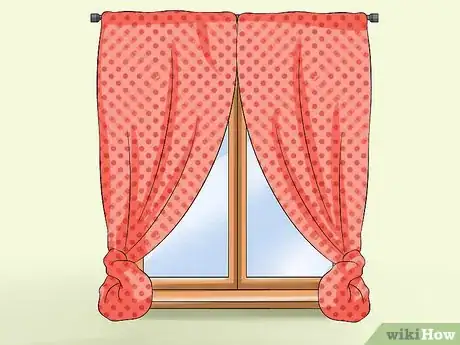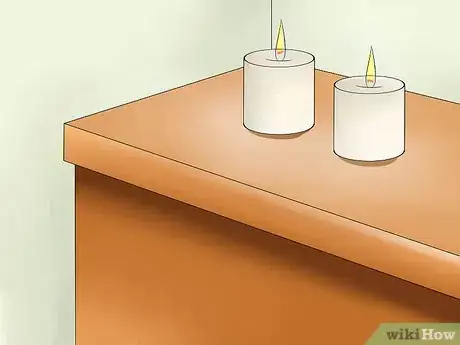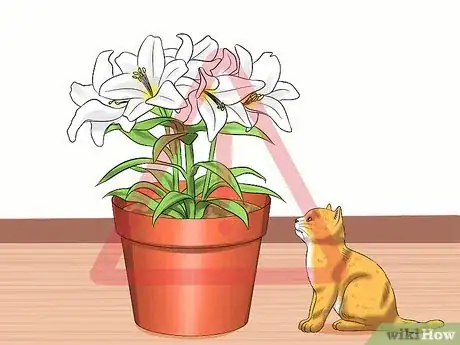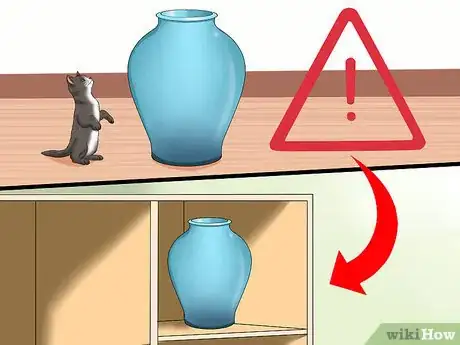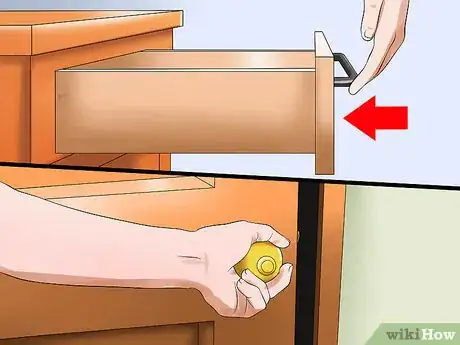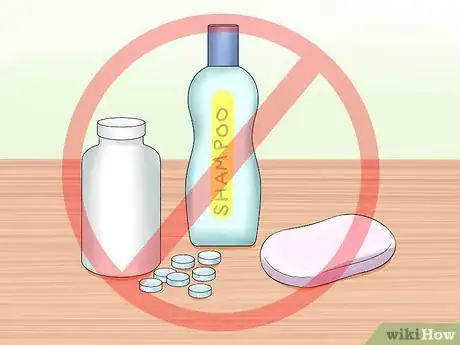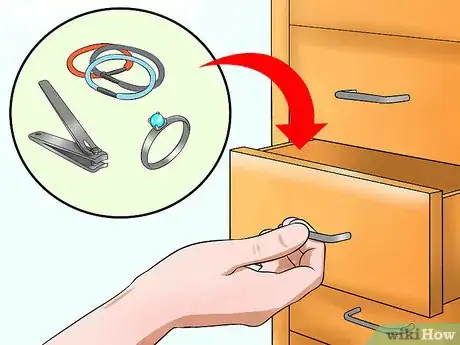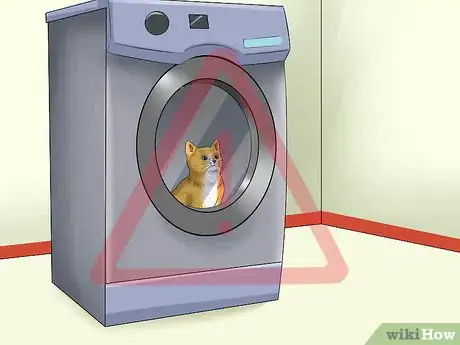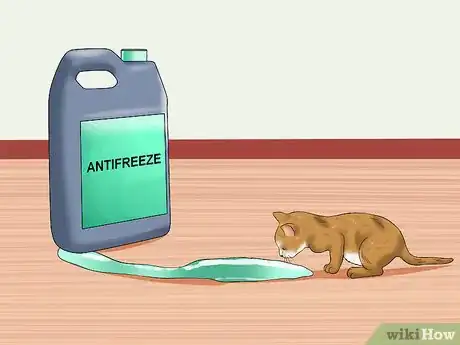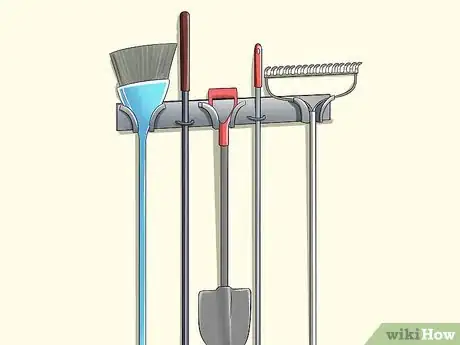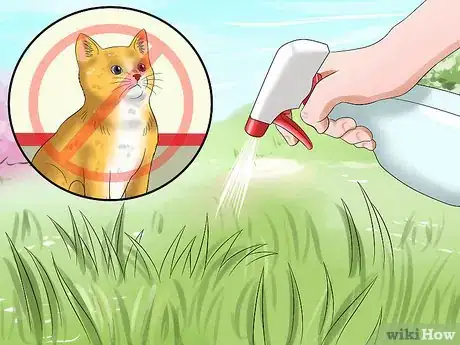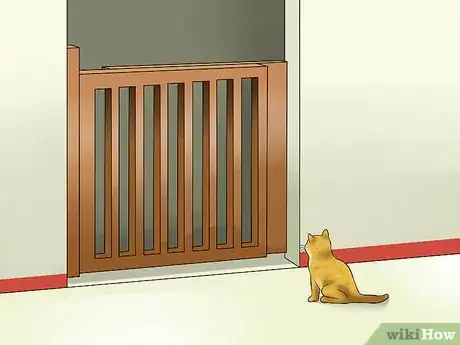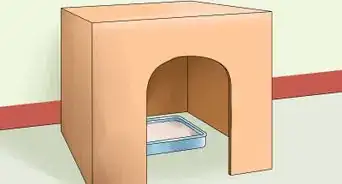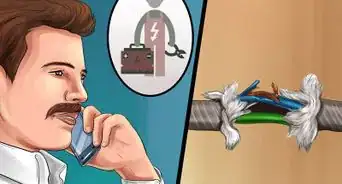This article was co-authored by Jean Johnson. Jean Johnson is a Cat Specialist and a writer for the KittyNook Blog. Jean specializes in providing advice on cat health, play, and general information about cats and cat breeds.
This article has been viewed 39,430 times.
Getting a kitten can be a cause of celebration and excitement. Before you bring your new furry friend home, you should also take steps to secure any hazards in your living space. This will protect your new pet from injury and prevent damage to your home. You should prepare each room, as well as any outdoor areas, to ensure your entire home is kitten proof.
Steps
Preparing the Kitchen and the Dining Room
-
1Put child-proof locks on the cabinet doors. You should start with one of the most used areas in most homes: the kitchen. Place child-proof locks on all cabinet doors and drawers in your kitchen as kittens can open them easily. Child-proof locks will make it more difficult for your kitten to get into the contents of your kitchen cupboards and drawers.[1] [2]
- You can find child-proof locks online or at your local hardware store. These locks are often made of plastic and will attach to the top of your cupboards and drawers. They act as a buffer to make it more difficult for small hands or paws to open a door or slide open a drawer.
- You should make sure there is a child-proof lock on the cupboard that contains your garbage and your recycling bins. You do not want your kitten getting into these bins, as they may end up eating or swallowing something that will make them sick.
-
2Block off any small open areas in the kitchen. Kittens tend to curl up in small spaces or areas, especially if they are in explore mode. You should try to block off any small open areas in your kitchen, such as under the refrigerator, the oven, and the dishwasher. You may use towels to block off these areas or use a solid piece of wood to cover these areas.[3] [4]
- You should also get in the habit of keeping all appliance doors closed at all times. Your kitten may end up trying to hide in your dishwasher or your microwave, especially if they are often left open and are low to the ground.
- Once your kitten in your home, you should get in the habit of checking inside these appliances before you turn them on. You do not want to end up washing your kitten with your dishes!
Advertisement -
3Store away all cleaning supplies. Household cleaning supplies often contain ingredients that can be toxic to animals, such as bleach and ammonia. Make sure you store all cleaning supplies away in a cupboard that has a child-proof lock or that is very high up, with no surrounding ledges that the kitten can climb on.[5] You do not want to risk your kitten eating or licking these chemicals.[6] [7]
- You should also get in the habit of keeping your kitten out of the room when you are cleaning. Secure your kitten in a fenced off area far from the cleaning area. This will ensure your kitten does not end up licking or eating any of the cleaning materials.
-
4Secure all electrical cords on appliances. Your new kitten will likely try to chew or nibble at anything that resembles a piece of string, including any electrical cords. Keep your kitten safe from electrical risks by securing all cords on the appliances in your kitchen. Do this by using an electrically safe tie around the cords so they are tight and secure behind the appliance.[8] [9]
- You can also wrap the cords in electrical tape and secure them against the counter or along a back wall so they are not loose. This will make it more difficult for your kitten to play with the cords and chew on them.
-
5Keep the dining room table bare. If you tend to keep a tablecloth or table settings on your dining room table, you should remove them so the table is bare. Your curious new kitten may end up climbing on the table and scratching up the tablecloth or the table settings.[10]
- If you have dining room chairs with upholstered cushions, you may want to also put plastic or a slick cover over them to protect them. Your kitten may end up scratching the cushions when she explores her new home.
Securing the Living Room and the Bedrooms
-
1Secure all electrical cords on lamps or computers. You should do a walk through of your living room and the bedrooms in your home to make sure all electrical cords are secure. Check the cords on desk lamps and alarm clocks on side tables in the room. Make sure the cords are rolled tight and secure behind the lamp or clock. You can also wrap the cords in electrical tape and secure them against a wall or on the ground to ensure they are not loose and easy to reach.[11] [12]
- If you have an office area in your home with a computer and computer equipment, take special care to secure all power cords. You should tuck any power bars in hard to reach areas on the ground and make sure all power cords are secure.
-
2Tie back the strings on curtains and drapery. You should also go through your living room and your bedrooms to make sure there are no loose ribbons or strings. Double knot all curtain strings so they are high up and out of reach. Tie up any drapery ribbons by the windows so they are not hanging on the ground.[13] [14]
- If the windows in your home have screens on them, you should also check to make sure the screens are secure on the windows. This will prevent your kitten from slipping out through a loose screen when the windows are open.
-
3Keep candles and fire hazards out of reach. You should move any candles to high shelves in the bedrooms or store them away in drawers. You should also keep any incense in high areas or stored away so they do not create a fire hazard for your new kitten.[15] [16]
- You may also want to avoid using candles or incense around the house until your kitten is trained and less likely to try to paw the fire. This will protect your kitten from injury.
-
4Remove any poisonous plants. If you tend to keep plants in the living room or the bedrooms, you should make sure they are not poisonous to cats. Lilies, sago palms, oleanders, rhododendrons, and castor beans are harmful houseplants that you should remove and keep out of your home indefinitely, or until you're no longer a cat owner.[17] [18] [19]
- Most cats will chew on grass and plants, especially if they are curious about a new environment. Even plants that are non-poisonous can cause vomiting and diarrhea in cats so try to keep plants out of reach or remove them.
- You can find a list of toxic plants on the ASPCA's website.
-
5Store away all breakable items. Kittens can accidentally knock over items on tables, shelves, and desks. You should prevent breakable items from getting damaged by storing them away in cupboards or drawers. Move any family heirlooms or precious glass items into a room that is off limits to your kitten or wrap them and put them away.[20] [21]
- You should also store away any items that could be ingested by your kitten. If the item is small enough to fit in your kitten’s mouth, it’s a choking hazard and should be stored away.
-
6Keep bedroom drawers, doors, and closets closed. You should also make sure all bedroom drawers, cupboards and closet doors are closed. Kittens love to hide in warm, dark spaces so keeping these areas blocked off will prevent you from “losing” your new pet in your home.[22] [23]
- You should also block off any spaces under your bed with boxes so your kitten cannot hide underneath the beds.[24]
Kitten-Proofing the Bathrooms and the Laundry Room
-
1Keep the toilet seat down. You should always make sure the toilet seat in your bathroom is down, as you do not want your kitten to fall in and potentially drown in the water. You should also remind everyone in your home to keep the toilet seats down so they are not a hazard to your kitten.[25]
-
2Lock up medication, cosmetics, and soaps. Medication can be harmful for your kitten, especially if the pills or tablets are easy to reach and ingest. Beauty products, cosmetics, and soaps can also be harmful for your kitten if they get access to these items. Keep all medications, cosmetics, beauty products and soaps in cupboards or drawers with child-proof locks.[26]
- You should try to get in the habit of putting medication away once you are done using them, rather than leave them on the countertops. You should also put away all cosmetics and beauty products so they are not out and accessible to your kitten.
-
3Store away all hair ties, razors, and jewellery. If you keep any of these items in your bathroom, you should make sure they are stored away securely in drawers or cupboards with child-proof locks. You should take extra care with sharp items like shaving razors, nail clippers, and metal nail files. Keep these items in a locked drawer so they are not a hazard to your kitten.
- You should also keep all jewellery in a secure box with a lock so your kitten cannot access any of your precious items. Rings, earrings, and pendants can all be swallowed by your kitten or damaged by your kitten.
-
4Keep the washer and dryer doors closed. This will prevent your kitten from hiding in these areas. Try to get in the habit of always closing these doors once you are done using them or once they have been loaded with clothing.[27]
- You should also make sure detergent and cleaning supplies are stored away in a secure cupboard or drawer in your laundry room. You may use child-proof locks on the cupboard so your kitten cannot access these potentially toxic products.
Securing the Garage and All Outdoor Areas
-
1Move any hazardous chemicals out of reach. Your garage may be full of cleaning supplies for your car or your home as well as chemicals for gardening and yard work. Make sure these hazardous chemicals are moved to high shelves that are difficult to access for your kitten or placed in cupboards with child-proof locks. You want to keep these products out of reach so your kitten is not at risk.[28] [29]
- If you notice any anti-freeze or oil on the floor of your garage, you should clean it up with soap and water. This will prevent your kitten from licking these hazardous chemicals and getting sick.
-
2Secure gardening equipment and tools. You should make sure that any gardening tools or equipment are secured against a high wall or on a high shelf. You should also keep any loose parts or machinery in sealed bags so they are not at risk of falling on your kitten.[30] [31]
- You may want to keep these tools in child-proof drawers or hang them flush against a high wall. If you have too many tools to store in drawers, you may decide that the garage is an off limits area for your kitten.
-
3Keep cats away from toxic plants in the garden. If you end up letting your kitten in the yard, make sure there are no toxic plants in the garden or yard. You may pull out plants that are toxic or cover the plants so they are more difficult to access.[32] [33]
- Ideally, you should keep your kitten indoors for most of the day. You may allow your kitten outside in an enclosure to keep her from running away or getting into the garden.
- You can find a list of toxic plants on the ASPCA's website.
-
4
-
5Secure all balconies and fence doors. You should also fence off any balconies in your home so your kitten is not at risk of falling over the balcony or sliding through the slates on the balcony. You should make sure all fence doors are locked in your yard or garden so your kitten cannot leave your yard unattended.
- You may decide to fence off an area of your yard with a baby fence or a pet fence so your kitten can play outside in a secure area.
References
- ↑ http://www.mypet.com/new-pet-owner/kitten-proof-home.aspx
- ↑ http://www.cat-world.com.au/cat-proofing-your-home
- ↑ http://www.mypet.com/new-pet-owner/kitten-proof-home.aspx
- ↑ http://www.cat-world.com.au/cat-proofing-your-home
- ↑ Jean Johnson. Cat Expert.
- ↑ http://www.mypet.com/new-pet-owner/kitten-proof-home.aspx
- ↑ http://www.cat-world.com.au/cat-proofing-your-home
- ↑ http://www.mypet.com/new-pet-owner/kitten-proof-home.aspx
- ↑ http://www.cat-world.com.au/cat-proofing-your-home
- ↑ http://www.humanesociety.org/animals/cats/tips/cat_proofing_your_house.html
- ↑ http://www.mypet.com/new-pet-owner/kitten-proof-home.aspx
- ↑ http://www.cat-world.com.au/cat-proofing-your-home
- ↑ http://www.mypet.com/new-pet-owner/kitten-proof-home.aspx
- ↑ http://www.cat-world.com.au/cat-proofing-your-home
- ↑ http://www.mypet.com/new-pet-owner/kitten-proof-home.aspx
- ↑ http://www.cat-world.com.au/cat-proofing-your-home
- ↑ Jean Johnson. Cat Expert.
- ↑ http://www.mypet.com/new-pet-owner/kitten-proof-home.aspx
- ↑ http://www.cat-world.com.au/cat-proofing-your-home
- ↑ http://www.mypet.com/new-pet-owner/kitten-proof-home.aspx
- ↑ http://www.cat-world.com.au/cat-proofing-your-home
- ↑ http://www.mypet.com/new-pet-owner/kitten-proof-home.aspx
- ↑ http://www.cat-world.com.au/cat-proofing-your-home
- ↑ Jean Johnson. Cat Expert.
- ↑ http://meowcatrescue.org/resources/articles/13/kitten-proofing-your-home/
- ↑ http://www.vetstreet.com/dr-marty-becker/how-to-kitten-proof-your-home
- ↑ http://www.vetstreet.com/dr-marty-becker/how-to-kitten-proof-your-home
- ↑ http://www.cat-world.com.au/cat-proofing-your-home
- ↑ http://meowcatrescue.org/resources/articles/13/kitten-proofing-your-home/
- ↑ http://www.cat-world.com.au/cat-proofing-your-home
- ↑ http://meowcatrescue.org/resources/articles/13/kitten-proofing-your-home/
- ↑ http://www.cat-world.com.au/cat-proofing-your-home
- ↑ http://meowcatrescue.org/resources/articles/13/kitten-proofing-your-home/
- ↑ http://www.cat-world.com.au/cat-proofing-your-home
- ↑ http://meowcatrescue.org/resources/articles/13/kitten-proofing-your-home/
About This Article
To kitten proof your home, put any cleaning supplies or houseplants that may be poisonous out of reach, since you don’t want to risk your kitten eating them. Since kittens love to chew, secure any cords from electrical appliances by wrapping them in electrical tape and securing them against the wall. Before you let your kitten roam your house, keep cupboard doors, drawers, and closets closed to avoid losing your new pet. Kittens like to explore the home, so you should make sure to close any appliance doors after you’ve used them or your kitten may end up hiding in them. For more advice from our Veterinary co-author, including how to kitten proof your garden, keep reading!
